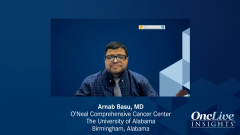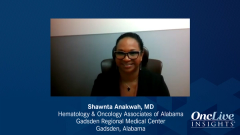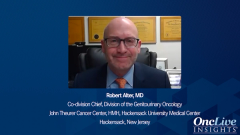
Unmet Needs in the Management of Advanced RCC
Drs Alter and Diamond muse about the unmet needs in advanced RCC treatment.
Episodes in this series

Robert Alter, MD: We’ve had a robust discussion, we’ve covered a lot of information. In our remaining time, let’s talk about the final question we always have to ask. As far as your patients in your practice and the signs that we see, what do you think is the unmet need? What do you believe are the future perspectives in renal cell cancer?
Elan Diamond, MD: That’s a great question. I alluded to some of these things when we talked about the clinical trial needs. As we discussed appropriate second-line therapies, what happens when we introduce triplet therapy up front? When is it appropriate to discontinue our therapies for these patients?
The other thing would be: What’s the ideal adjuvant therapy for high-risk renal cell carcinoma [RCC]? Should we incorporate neoadjuvant therapy into that setting? There’s the PROSPER RCC trial right now with neoadjuvant nivolumab, so all these things are evolving. But the ideal would be to have a patient on an excellent frontline therapy, and maybe triplet therapy will be that frontline therapy that creates long-term durable responses with high CR [complete response] rates. It may cure a proportion of patients, like you saw in the cytokine era in terms of the tail of the curve. Those are the unmet needs as far as I can tell.
The other thing would be biomarkers. You hear a lot about this at the academic conferences. What biomarkers can we use to select patients who might do well with IO [immunotherapy] or TKI [tyrosine kinase inhibitor] monotherapy? Can we use it as a measure to see who can discontinue therapy and who can’t? Can we use it as a measure similar to the Signatera [assay] data in bladder cancer where you can select patients who would require adjuvant therapy? Those are all things that we should be striving for, and a lot of research is being done in that area.
Robert Alter, MD: I’d love to add something, but you hit every point that I’d add. The triplet therapy biomarker question will be interesting too. Can we utilize the biomarkers and predict? Triplet therapy starts off and you end up with things like combination therapy. But starting with anti-HIF-alpha inhibitors, at what point do we utilize that as a single agent when we find small renal tumors? These are amazing questions. The science is there, and I marvel at the scientists who are asking these questions.
To that end, I want to thank Dr Diamond for this very insightful discussion. To our viewing audience, thank you for joining us. We hope you found this OncLive® My Treatment Approach program to be useful and valuable to the treatment of your patients with RCC. Thank you.
Transcript edited for clarity.








































